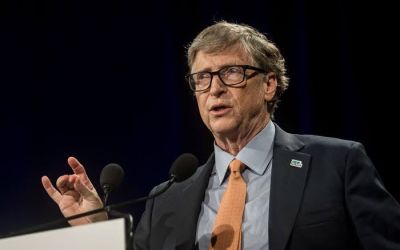At the GeekWire Summit, the Microsoft founder talked pandemic, climate change, and cement.
The pandemic will get worse before it gets better, and will continue to be a threat at least through 2021. The toughest climate challenge won't be the cars we drive, but the buildings we build. And even though things seem dire right now, in the big picture, life will continue getting better.
Those are just some of the predictions Bill Gates made during an hour-long fireside chat at the virtual GeekWire Summit conference last week. Gates answered questions from GeekWire editor-in-chief Todd Bishop on topics ranging from his late father to antitrust action against Big Tech. (Today's leaders aren't making the mistake of neglecting their relationships with government officials, he said, because, "Everybody saw what I did and knows better now.")
Here's some of what Gates predicted:
1. The pandemic will get worse before it gets better.
"Between now and the end of the year, things are going to get worse," Gates said, when asked for a timeline to beat Covid-19. "The model even a few months ago showed that with more people indoors and colder weather, both Europe and the U.S. rebound. And, unfortunately, that proved to be correct. So we can expect an increasing number of cases and deaths over the fall."
After that, he said, things will improve. "The good news is that better therapeutics -- primarily monoclonal antibodies -- will start to become available by the end of the year or early next year." Monoclonal antibodies are made by cloning white blood cells and can be targeted at particular antigens. President Donald Trump received this treatment as part of the cocktail used to defeat his Covid-19 infection. Eli Lilly recently paused its monoclonal antibody trial, but Gates is hoping it will restart soon.
Vaccines are also on their way, he said. "The likelihood is by early next year, two or three of the first six that are in phase three trials right now are likely to get approved. And that starts you on a path towards cutting transmission."
Gates said he hopes that, with vaccines available, schools will be able to move toward reopening. "Certainly by next fall, I would hope that we could get education back on track," he said. "So by late 2021, the U.S. could be in much better shape than we are right now."
Still, he cautioned, the pandemic won't be truly finished anywhere until it's defeated everywhere. "We won't be completely back to normal until we get rid of this virus everywhere in the world." He noted that some nations, such as New Zealand, Australia, and South Korea, quickly contained the virus only to see new infections arrive with visitors from abroad. "So global elimination, with a lot of cooperation, is something we think should be done."
2. We'll be better prepared to fight the next pandemic, and some of today's diseases, too.
One good thing to emerge from the current pandemic is that governments around the world, and the U.S. in particular, are doing a much better job of providing funds for pandemic response, Gates said. Perhaps even more important, the race to stop Covid-19 has accelerated development of RNA vaccines. Traditional vaccines work by infecting the recipient with inert, or "dead" pathogens in order to jump-start an immune response. RNA vaccines aren't entire pathogens but merely their "messenger" RNA, which produces a similar response from the immune system. Because they don't require the entire pathogen, RNA vaccines are safer to administer, easier to produce, and potentially more versatile.
"That's a very promising approach, both to shorten the time to create a new vaccine, and to be able to have a generalized factory that could be standing by no matter what disease you're going after," Gates said. "We want to use that platform to try and do an HIV vaccine, malaria vaccine, and TB vaccine."
3. The toughest climate change challenge won't be cars. It'll be buildings.
Most people think of fighting climate change in terms of greener energy, such as solar or wind power, and such solutions as driving electric cars. Gates said he supports those initiatives, but that we're facing a tougher problem when it comes to manufacturing cement and steel. "We don't have a way of making cement, that doesn't involve substantial emissions," he said.
That means that, while changes in human behavior to reduce carbon emissions can make a difference, "Tech is the only solution," he said. "Without innovation, there's no way. Fortunately, innovation -- although it's hard to predict -- across about 10 different areas, if we have those innovations, we can do very well." Gates is already backing Heliogen, a startup exploring ways to use solar power for high-temperature applications such as steel and cement manufacture.
4. If you look at the big picture, things are getting better.
Gates is famously optimistic, and that quality came through when Bishop asked him, "Bill, what gives you hope?"
"Overall, the basic framework is that life is getting better," Gates said. "Slowly but surely, we're recognizing how we treat minorities, how we treat women. Slowly but surely we're reducing cancer deaths, beginning to understand things like diabetes and Alzheimer's." There are setbacks, he acknowledged, and the pandemic is a huge example of that. But, "A hundred years ago, the death rate of children was about 30 percent before the age of five. There's nowhere in the world that's that bad now." While child mortality is still too high in some places, he added, "Progress will continue to take place. And so, you know, I'm upbeat."
Inc

